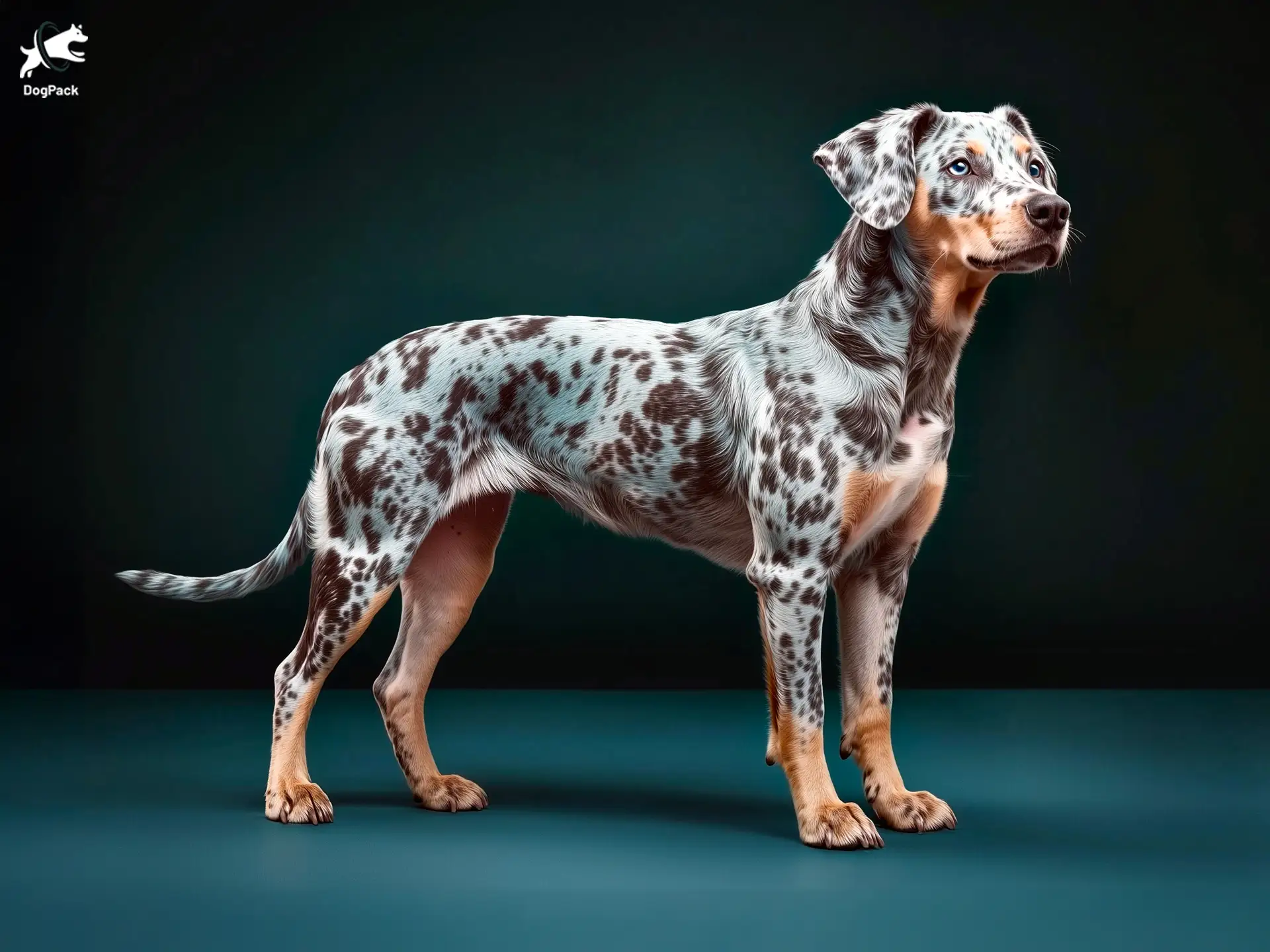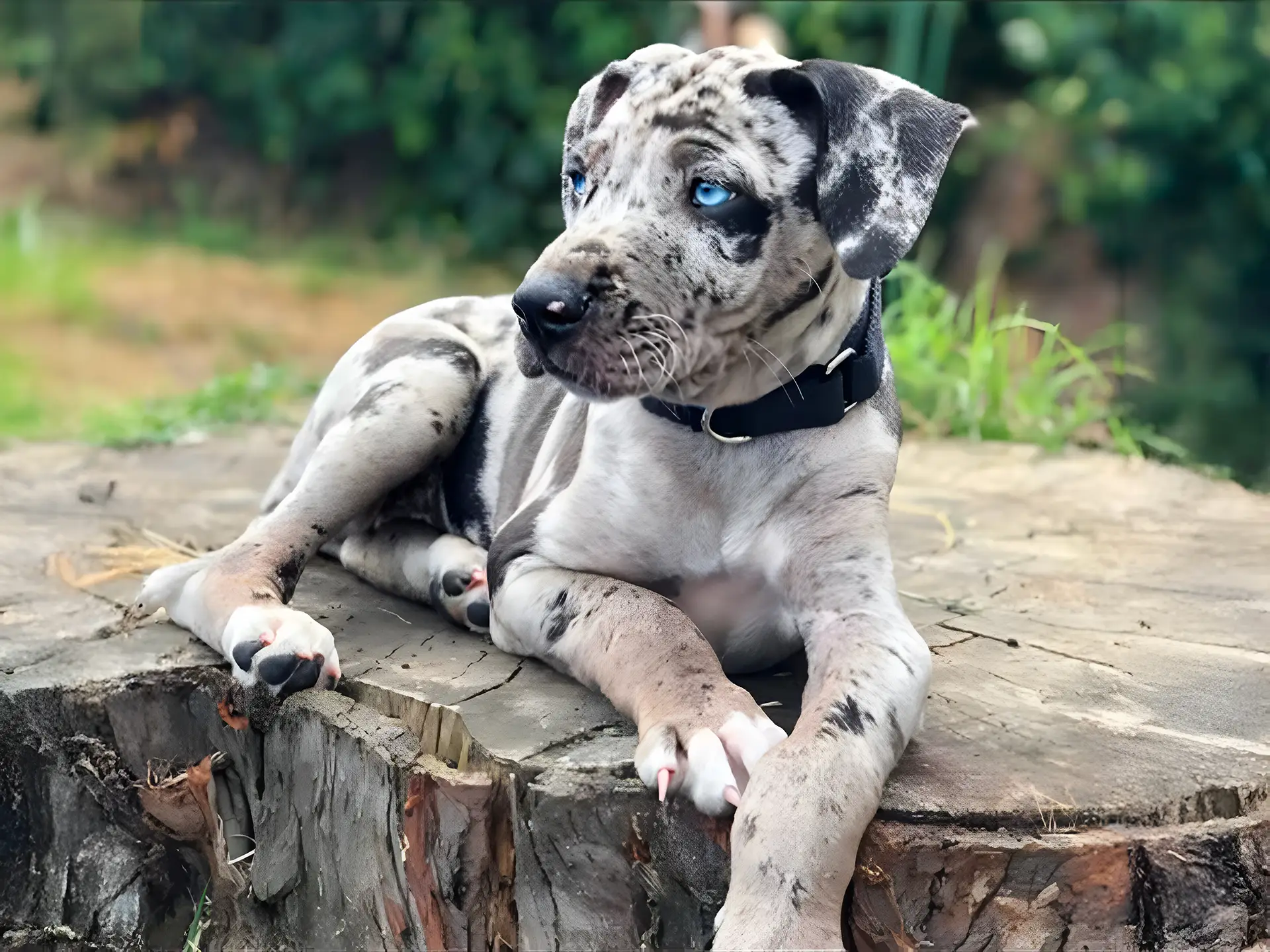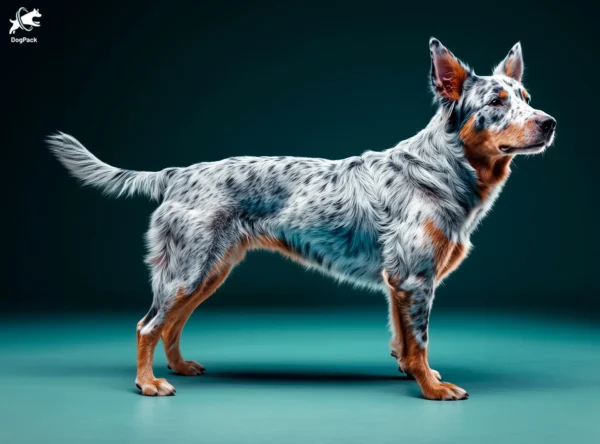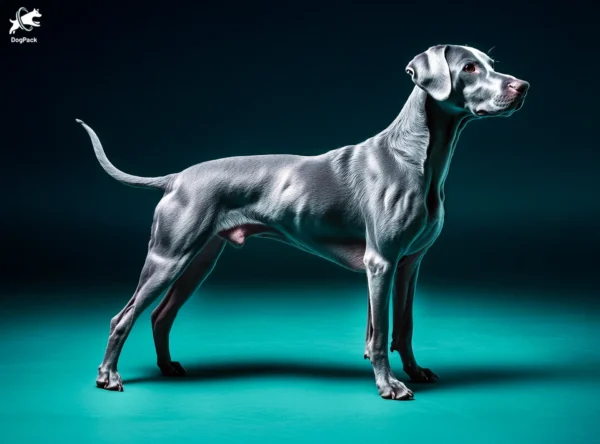Catahoula Leopard Dog Breed Info & Overview
The Catahoula Leopard Dog, a breed from Louisiana, is truly a work of art with its distinctive spotted coat and intense gaze. Renowned for its intelligence and boundless energy, this versatile working dog excels in challenging tasks and loves adventure. If you’re looking for a loyal, spirited companion with a strong work ethic, the Catahoula Leopard Dog is an impressive choice.
Characteristics
Pictures
Breed History
Did you know the Catahoula Leopard Dog is Louisiana’s state dog? Originating in the 16th century, this breed is believed to be a mix of Native American dogs and Spanish Mastiffs. Early settlers relied on them for hunting wild game in the dense swamps and forests of the region.
The breed’s unique name comes from Catahoula Parish in Louisiana, where they were first recognized. “Catahoula” is thought to mean “sacred lake” in the Choctaw language. These dogs were indispensable to ranchers for their ability to manage wild hogs and cattle.
Over the years, the Catahoula Leopard Dog has maintained its working heritage. Despite not being officially recognized by the AKC until recently, they’ve earned a loyal following among hunters and farmers. Their legacy as versatile working dogs continues to this day.
Temperament, Personality
With a Catahoula Leopard Dog, expect a loyal companion who’s not afraid of a challenge. These dogs are known for their independence and strong work ethic. They’re highly intelligent but can be a bit stubborn, so consistent training is key.
When it comes to family, Catahoulas are affectionate and protective. They form strong bonds with their owners but might be reserved around strangers. Early socialization is important to help them become well-rounded adults.
Due to their herding and hunting background, they have a high prey drive. This means they may not mix well with smaller pets without proper introductions. They’re energetic and thrive in environments where they have a job to do.
Physical Characteristics
One look at a Catahoula Leopard Dog, and you’ll see why they’re unforgettable. Their most striking feature is their coat, which comes in a variety of colors and patterns, often resembling a leopard’s spots. Eye colors can vary too, with some dogs having mesmerizing “cracked glass” or marble eyes.
These are medium to large dogs, with males typically larger than females. They have a muscular build that’s well-suited for the demands of a working dog. Their ears are typically drop-shaped, and they carry themselves with a confident gait.
Their coat is short to medium in length and can be single or double-layered, depending on the climate they originate from. This coat provides protection when they’re working in rough terrains like swamps and forests.
Health Issues
Like all breeds, the Catahoula Leopard Dog has some health concerns to be aware of. Deafness is a notable issue, particularly in dogs with a lot of white in their coat or blue eyes. It’s important to have puppies tested early for hearing capabilities.
Hip dysplasia can also occur in this breed, given their active nature and size. Regular check-ups and maintaining a healthy weight can help mitigate joint problems. Responsible breeders will screen for these conditions.
Skin issues may arise due to their short coat, especially if they spend a lot of time outdoors. Parasites and allergies can cause discomfort, so regular grooming and vet visits are essential. Overall, they are generally a healthy breed with proper care.
Grooming Needs
Good news for the busy dog owner: the Catahoula Leopard Dog has relatively low grooming needs. Their short coat requires minimal maintenance, just a weekly brushing to remove loose hair and keep their skin healthy.
Bathing can be done as needed, usually every few months unless they’ve had a particularly muddy adventure. Over-bathing can strip their coat of natural oils, so it’s best to keep it minimal. Use a gentle dog shampoo to avoid skin irritation.
Don’t forget about dental hygiene and nail care. Regular teeth brushing will help prevent dental issues, and nails should be trimmed monthly. Ear checks are also important, especially since their floppy ears can trap moisture leading to infections.
Exercise Requirements
If you’re looking for a couch potato, the Catahoula Leopard Dog isn’t it. These dogs are high-energy and need plenty of physical activity to stay happy and healthy. Aim for at least 1–2 hours of exercise per day.
Activities like hiking, running, and agility training are excellent outlets for their energy. They also excel at tasks that challenge their mind, such as puzzle toys or advanced obedience training. Idle minds can lead to destructive behaviors.
Without adequate exercise, they can become bored and take it out on your furniture or yard. Providing them with a job or purpose aligns with their working dog heritage and keeps them content. They’re ideal companions for active individuals or families.
Training Tips
Training a Catahoula Leopard Dog can be both rewarding and challenging. Their intelligence means they pick up commands quickly, but their independent streak can make them a bit headstrong. Consistency and positive reinforcement are key.
Start training and socialization early to curb any undesirable behaviors. Exposure to different people, places, and other animals will help them become more adaptable. Remember, they respond best to firm but gentle guidance.
Because they have a strong work ethic, incorporating tasks into their training can be beneficial. Activities like herding trials or scent work tap into their natural abilities and keep them engaged. Patience and persistence will pay off.
Nutrition, Diet
Feeding your Catahoula Leopard Dog a balanced diet is crucial for their health and energy levels. Given their active lifestyle, they require high-quality dog food rich in protein to support muscle development and maintenance.
Portion control is important to prevent obesity, which can lead to joint problems. Typically, an adult Catahoula may consume around 2.5 to 3.5 cups of dry kibble per day, divided into two meals. Always adjust portions based on activity level and age.
Consulting with your veterinarian can help tailor a diet plan specific to your dog’s needs. Some Catahoulas may benefit from diets that support joint health, including supplements like glucosamine and chondroitin. Fresh water should always be available.
Adoption, Breeders
If you’re considering adding a Catahoula Leopard Dog to your family, adopting from a rescue organization can be a rewarding option. Organizations like the National Association of Louisiana Catahoulas specialize in this breed.
For those interested in purchasing a puppy, it’s vital to find a reputable breeder who conducts health screenings. The American Kennel Club’s Breeder Referral is a good starting point to find responsible breeders.
Avoid puppy mills or pet stores where the dog’s health history is unknown. Reputable breeders will provide health certificates and allow you to meet the puppy’s parents. This ensures you’re getting a healthy and well-socialized pup.
Family Pet?
The Catahoula Leopard Dog can make a wonderful family pet for the right household. They’re affectionate with their family members and enjoy being part of daily activities. However, their high energy levels mean they might not be suited for everyone.
They tend to do well with older children who understand how to interact with dogs. Their size and exuberance might be overwhelming for toddlers. Supervision is always recommended to ensure positive interactions.
With other pets, early socialization is key. Their strong prey drive can make them less compatible with small animals like cats or rabbits. They may get along with other dogs if properly introduced, but can be territorial.
Right For You?
Are you ready for an adventure buddy who’s always up for a challenge? The Catahoula Leopard Dog might be the perfect match if you lead an active lifestyle and have experience with strong-willed breeds.
They thrive in homes where they have space to roam and tasks to perform. Apartment living or sedentary households may lead to frustration for both dog and owner. They require time, dedication, and understanding.
Ultimately, if you’re looking for a loyal, intelligent, and energetic companion, and you’re willing to put in the effort to meet their needs, the Catahoula Leopard Dog could be your ideal canine partner.
Conclusion
Bringing a Catahoula Leopard Dog into your life can be incredibly rewarding if you’re prepared for the commitment. Their unique blend of intelligence, loyalty, and energy makes them stand out among dog breeds. They’re best suited for active, experienced owners who can provide the physical and mental stimulation they crave. If that sounds like you, this vibrant breed might just be your perfect match.
FAQs
-
Why are Catahoula Leopard Dogs known for their unique coat patterns?
Catahoula Leopard Dogs often display striking merle or leopard-like coat patterns, a result of their genetic background. This unique coloration contributes to their name and is one of their most distinguishing features.
-
How well do Catahoula Leopard Dogs adapt to colder climates?
Catahoula Leopard Dogs are more suited to warmer climates due to their short coat. While they can handle cooler weather, extra warmth is recommended for prolonged outdoor activities in cold temperatures.
-
Are Catahoula Leopard Dogs prone to deafness?
Due to their merle gene, some Catahoula Leopard Dogs may have an increased risk of deafness, especially those with predominantly white coats. Regular hearing checks are essential, particularly in puppies from merle or leopard-patterned lines.
-
Do Catahoula Leopard Dogs require mental stimulation?
Yes, Catahoula Leopard Dogs are intelligent and benefit greatly from mental challenges. Scent work, puzzle toys, and advanced obedience exercises keep them mentally stimulated and prevent boredom.
-
How much space does a Catahoula Leopard Dog need?
Catahoula Leopard Dogs thrive in homes with ample space to run. Their high energy and natural instincts make them better suited for rural or suburban areas with large yards rather than small apartments.
Breed Ratings
Catahoula Leopard Dogs are smart and learn quickly but can be independent thinkers, requiring consistent training.
They enjoy playtime but often prefer purposeful activities over casual games, reflecting their working dog nature.
High energy levels mean they need plenty of physical activity; they’re ideal for active owners who enjoy the outdoors.
Moderate shedders with a short coat; regular brushing helps manage shedding and keeps their coat healthy.
Strong prey drive due to their hunting background; caution is needed around smaller animals and pets.
Low-maintenance grooming with their short coat; occasional baths and regular brushing suffice.
Intelligent but can be stubborn; they require experienced handlers who use positive reinforcement methods.
They prefer companionship and can develop separation anxiety if left alone for long periods.
Moderate vocalization; they may bark to alert or when bored but are not excessive barkers.
Minimal drooling compared to other breeds; generally not an issue for most owners.
Can be territorial with other dogs; early socialization is important to promote friendly interactions.
Generally healthy with few breed-specific issues; regular vet care keeps them in top condition.














